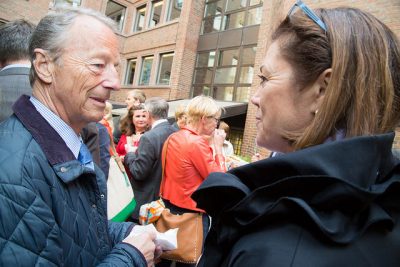“We have been naive and stupid,” declared Gerhard Heiberg, Norway’s veteran member of the International Olympic Committee (IOC), after last week’s revelations of systematic, state-run doping among Russian athletes. Critics added “cowardly” after the IOC later decided not to ban the entire Russian team from the upcoming Summer Olympics in Rio de Janeiro after all.

“It was expected that there would be various views on that (decision),” Heiberg told news bureau NTB on Wednesday. He had been unusually candid and willing to take on at least some responsibility for the sports world’s latest doping scandal, and told newspaper Aftenposten that he favoured banning Russian athletes from the Rio games.
“We couldn’t have imagined anything worse than this, doping that’s been part of a system directed by the (Russian) state,” Heiberg told Aftenposten after an independent commission appointed by the World Anti-Doping Agency (WADA) confirmed and exposed the Russian doping. It’s now seen as what made it possible for Russian athletes to claim 33 medals at the Winter Olympics on their home turf in Sochi 2014. Those Olympics were also criticized for their extravagance and record high costs.
“We had confidence in the Russians that wasn’t held up,” Heiberg added. “Russia has gone behind our backs and behind WADA’s back. We have been suspicious and followed the situation, but they managed to keep everything that happened out of sight from our observers.”
Heiberg sent on to say the IOC had been “naive and relied that the (anti-doping) agreements we had were maintained. We have been stupid, there’s no doubt about that. Both we and Russia have to pay for that now.”
Changed his mind
When the IOC met over the weekend, however, the 77-year-old Heiberg changed his mind. Instead of taking a tough line, the IOC opted against banning the entire Russian team, choosing instead to impose other demands on the Russians that they must meet in order to take part in Rio. Russian athletes who have been charged with doping earlier, for example, will be banned, and the IOC declared that Russian athletes must prove they are drug-free to their own athletics federation.
That’s not good enough for IOC critics like Mads Kaggestad, a Norwegian sports commentator and former coach for Norway’s Olympic track and field athletes. “I think it’s cowardly,” Kaggestad told Aftenposten on Monday. “Now the IOC had a chance to set an example. I think this just reflects how the IOC has wanted to avoid the doping issue.” He has earlier criticized what he calls the “ostrich politics” of the IOC, which prefers to “put their heads in the sand” when confronted with serious or embarrassing issues. The IOC, Kaggestad claimed, simply doesn’t dare ban a country as large as Russia.
‘Don’t dare challenge Russia’
He also cited “massive cameraderie, different interpretations of the rules among various national sports federations, double roles held by key officials and other dilemmas. “What they (the IOC) is saying is that they don’t dare challenge Russia,” Kaggestad said.
He was backed by Anders Solheim, leader of Norway’s own anti-doping agency. The lack of a total ban on Russia “is disappointing,” Solheim told NTB. “Here the IOC had an historic opportunity to take the integrity of international sports and anti-doping efforts seriously, but they didn’t do that. Instead they pass the buck over to the national federations.”
Andreas Selliaas, a sports blogger and former researcher at the Norwegian foreign policy institute NUPI, agreed. He cited a “close relationship” between IOC President Thomas Bach and Russian President Vladimir Putin, and “many strong Russian interests” within the IOC. “There are too many close ties between the IOC and Russia, and I think the IOC has been very clear that it won’t provoke Russiam” Selliaas told Aftenposten.
Attempted defense
Heiberg disagreed, and attempted to defend the IOC and why he’d changed his own mind regarding how Russia should be punished. “I have had discussions with colleagues at the IOC and the office in Lausanne and allowed myself to change my view a bit,” Heiberg told NTB.
He insisted, after softening his own initial criticism of Russia, that the IOC action will amount to a near-total ban on Russian athletes in practice. “I’m extremely satisfied with the decision we have made,” Heiberg told Aftenposten. “I feel it was correct. We are basically excluding all the athletes with a few exceptions. The few who’ll be allowed to participate will have to get through the eye of the needle.” Neither Maxim Kustov nor Ilya Frolov, for example, will be allowed in Rio after they were named in the doping report. Five Russian paddlers had also been excluded as of Wednesday.
Heiberg, meanwhile, was also having to deal with many problems in Rio itself, from the pollution that’s been meeting sailors in the bay to unfinished and flawed accommodation for athletes, traffic congestion and other unfinished facilities. The Olympics are scheduled to begin on August 6.
newsinenglish.no/Nina Berglund

